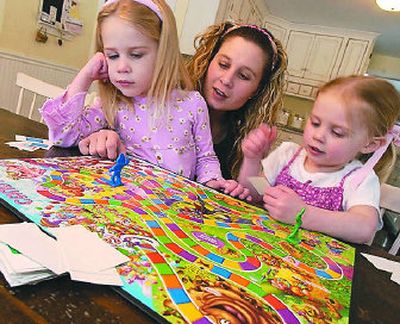Busy lives prompt speedier games

PROVIDENCE, R.I. — Michelle Hastings admits she’s sometimes cheated to get through a game of Candy Land with her 5-year-old daughter, Campbell. The board game can take just too long, she said. Disney Monopoly is another big offender.
“A game like that, it could literally take you days,” said Hastings, of Holliston, Mass. “A lot of times, you don’t play games because they take so long.”
Board game makers are heeding pleas of parents like Hastings and introducing games tailored to busy lives and shorter attention spans that take only about 20 minutes to play.
Hasbro Inc., the nation’s largest game company, is releasing a streamlined version of The Game of Life that uses a Visa card rather than cash and a “LifePod” that electronically keeps track of points — which can keep the game moving. The Pawtucket, R.I.-based company is also introducing three “Express” versions of classic board games this year: Monopoly Express, Scrabble Express and Sorry Express.
“A lot of people like playing games, but they want resolution,” said Jim Silver, editor-in-chief of Toy Wishes magazine. “And that’s why you see some of these quicker games coming out.”
The changes come at a time when the board games business is more competitive than ever. Hasbro is fighting for market share with El Segundo, Calif.-based Mattel Inc. and Seattle-based Cranium Inc., which made a splash when it debuted a few years ago with a game that draws on players’ varied talents like drawing and humming.
Total board game sales were up 13 percent to $802.2 million in 2006, after falling 8 percent in 2005 to $706.2 million, according to market research company NPD Group.
Of that, Hasbro controls 51.3 percent of the market, according to NPD. But Sean McGowan, an analyst with Wedbush Morgan Securities, said that’s down from in the past when Hasbro controlled 75 percent to 80 percent of the board game market.
Fast games are nothing new: think the classic card game Uno or the timed word-building game Boggle. But analysts say game makers are more aggressively concentrating on fast games and even retooling classic games so they don’t take so long.
The Game of Life: Twists & Turns Edition lets players determine ahead of time how long, or short, they want to game to last. Monopoly is getting an optional “speed die,” rolled in addition to the regular two dice. Certain rolls will move the player to the next available property, moving the game along.
Hasbro’s Express games incorporate concepts and pieces from the classic versions of the games, although game play is entirely different. In Monopoly Express, for example, players roll dice labeled with properties and the “Go to Jail” policeman of the classic game. Players get points for building blocks of properties — but lose their turn and their points if they roll three policemen.
While a Monopoly game can drag on as players duke it out to avoid bankruptcy, Monopoly Express moves quickly, and players decide on a winning money value ahead of time so they can play a long or short game.
Best of all for busy parents and kids, the games are brief and they’re packaged differently so they can be taken along in the car.
“It’s analogous to a kid picking up his Game Boy for 10 minutes,” said Chris Byrne, an independent toy consultant based in New York. “Yet it involves the whole family.”
McGowan said board games are a backbone of Hasbro, representing about 25 percent to 30 percent of the company’s total sales. But its customers’ interests are evolving: “When they’re 10, they’re more likely to be texting each other on cell phones,” he said. “It’s extremely important for Hasbro to do whatever they can to hold onto and grow their games business.”
Cranium is coming out this year with Jam Pack Jam, a race against an 18-second timer to pack a car trunk full of stuff, and Triple Triumph, a 3D pyramid-building game. Its Whoonu game, released in 2005, quizzes players on their competitors’ likes and dislikes. The games take 20 minutes or less to play, so gamers can play as many or as few rounds as they want.
“It puts the control back in the consumers’ hands,” Byrne said.
There’s also a trend toward DVD games, which can be speedier and more interactive than traditional board games. The “Scene It” series of trivia games from Mattel incorporate DVDs that contain clips from movies and TV shows along with a board. Game play lasts about half an hour.
Hasbro has also released DVD versions of Candy Land, which has players put color blocks around the living room as a real-world game board; Clue — which has butler and inspector characters who walk players through the game with a narrative storyline; and Twister, which gets players up and moving with a dance party mode and instructional mode.
“Games are becoming, in a lot of respects, entertainment,” Silver said.
Even without the ideas of game makers, game players will often make up shorter versions of existing games or will use the pieces of other games to come up with new ones.
Tracie Broom, a San Francisco writer, and her friends cannibalize Scrabble to play a quicker word game — called alternately Anagram or Grab Scrabble. They put the Scrabble tiles face down, and flip them over one-by-one, calling out new words as they are formed, or stealing words from other players.
It takes 15 to 20 minutes to play.
“That’s one of the reasons why we play it the way we do,” Broom said. “It is so much more exciting than Scrabble.”